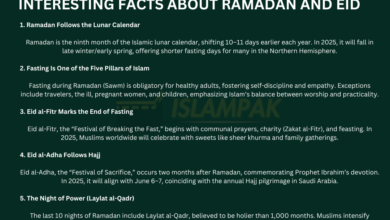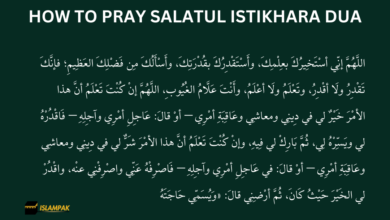4 qul surah with English and urdu translation – Islampak

What Are The 4 Qul Surahs? The 4 Quls refer to four specific Surahs in the Quran that begin with the word “Qul,” which means “Say.” These Surahs are:
- Surah Al-Kafirun (Chapter 109)
- Surah Al-Ikhlas (Chapter 112)
- Surah Al-Falaq (Chapter 113)
- Surah An-Nas (Chapter 114)
Each of these Surahs serves a unique purpose, primarily focusing on the oneness of Allah, seeking protection from evil, and rejecting disbelief.
Surah Al-Kafirun emphasizes the distinction between the beliefs of Muslims and non-Muslims, while Surah Al-Ikhlas highlights the concept of monotheism.
Surah Al-Falaq and Surah An-Nas are often recited for protection against external evils, including black magic and harmful whispers from Jinn and humans vital part of daily prayers for many Muslims
Surah Al-Ikhlas (The Sincerity)
قُلْ هُوَ اللَّهُ أَحَدٌ
اللَّهُ الصَّمَدُ
لَمْ يَلِدْ وَلَمْ يُولَدْ
وَلَمْ يَكُن لَّهُ كُفُوًا أَحَدٌ
English Translation:
“Say, ‘He is Allah, [who is] One, Allah, the Eternal Refuge. He neither begets nor is born, Nor is there to Him any equivalent.'”
Urdu Translation:
“کہو، ‘وہ اللہ ہے، ایک، اللہ، ابدی پناہ گاہ۔ وہ نہ پیدا کرتا ہے اور نہ پیدا کیا گیا ہے، اور اس کا کوئی ہمتا نہیں ہے۔'”
Arabic Transliteration:
“Qul huwa Allahu ahad. Allahu-s-Samad. Lam yalid wa lam yulad. Wa lam yakun lahu kufuwan ahad.”
Surah Al-Falaq (The Daybreak)
قُلْ أَعُوذُ بِرَبِّ الْفَلَقِ
مِن شَرِّ مَا خَلَقَ
وَمِن شَرِّ غَاسِقٍ إِذَا وَقَبَ
وَمِن شَرِّ النَّفَّاثَاتِ فِي الْعُقَدِ
وَمِن شَرِّ حَاسِدٍ إِذَا حَسَدَ
English Translation:
“Say, ‘I seek refuge in the Lord of the daybreak, From the evil of that which He created, And from the evil of darkness when it settles, And from the evil of the blowers in knots, And from the evil of an envier when he envies.'”
Urdu Translation:
“کہو، ‘میں صبح کے رب کی پناہ مانگتا ہوں، اس کی پیدا کردہ چیزوں کی برائی سے، اور آنے والی تاریکی کی برائی سے، اور گرے ہوئے گرہوں میں پھونکنے والوں کی برائی سے، اور حسد کرنے والے کی برائی سے جب وہ حسد کرے۔'”
Arabic Transliteration:
“Qul a’ūdhu birabbil-falaq, Min sharri mā khalaqa, Wa min sharri ghāsiqin idhā waqab, Wa min sharrin-naffāthāti fil-‘uqad, Wa min sharri hāsidin idhā hasad.”
Surah An-Nas (Mankind)
قُلْ أَعُوذُ بِرَبِّ النَّاسِ
مَلِكِ النَّاسِ
إِلَـٰهِ النَّاسِ
مِن شَرِّ الْوَسْوَاسِ الْخَنَّاسِ
الَّذِي يُوَسْوِسُ فِي صُدُورِ النَّاسِ
مِنَ الْجِنَّةِ وَالنَّاسِ
English Translation:
“Say, ‘I seek refuge in the Lord of mankind, The Sovereign of mankind, The God of mankind, From the evil of the retreating whisperer – Who whispers [evil] into the breasts of mankind – From among the jinn and mankind.'”
Urdu Translation:
“کہو، ‘میں انسانوں کے رب کی پناہ مانگتا ہوں، انسانوں کے بادشاہ کی، انسانوں کے معبود کی، اس بھگتے ہوئے وسوسے کی برائی سے جو انسانوں کے سینوں میں وسوسے ڈالتا ہے – جن اور انسانوں میں سے۔'”
Arabic Transliteration:
“Qul a’ūdhu birabbīn-nās, Malikin-nās, Ilāhin-nās, Min sharril-waswāsil-khannās, Alladhī yuwaswisu fī sudūrin-nās, Minal-jinnati wan-nās.”
Surah Al-Kafirun (The Disbelievers):
قُلْ يَا أَيُّهَا الْكَافِرُونَ
لَا أَعْبُدُ مَا تَعْبُدُونَ
وَلَا أَنْتُمْ عَابِدُونَ مَا أَعْبُدُ
وَلَا أَنَا عَابِدٌ مَا عَبَدْتُمْ
وَلَا أَنْتُمْ عَابِدُونَ مَا أَعْبُدُ
لَكُمْ دِينُكُمْ وَلِيَ دِينِ
English Translation:
“Say, ‘O disbelievers, I do not worship what you worship. Nor are you worshippers of what I worship. Nor will I be a worshipper of what you worship. Nor will you be worshippers of what I worship. For you is your religion, and for me is my religion.'”
Urdu Translation:
“کہہ دو، ‘اے کافرو! میں اس کی عبادت نہیں کرتا جس کی تم عبادت کرتے ہو۔ اور نہ تم ہو اس کی عبادت کرنے والے جس کی میں عبادت کرتا ہوں۔ اور نہ میں ہوں اس کی عبادت کرنے والا جس کی تم عبادت کرتے ہو۔ اور نہ تم ہو اس کی عبادت کرنے والے جس کی میں عبادت کرتا ہوں۔ تمہارے لیے تمہارا دین اور میرے لیے میرا دین۔'”
Arabic Transliteration:
Qul yā ayyuhal-kāfirūn.
Lā a’budu mā ta’budūn.
Wa lā antum ‘ābidūna mā a’bud.
Wa lā ana ‘ābidun mā ‘abattum.
Wa lā antum ‘ābidūna mā a’bud.
Lakum dīnukum wa liya dīn.
Also Read: Last 2 ayat of surah al baqarah
What Are The Benefits Of Reciting 4 Kuls?
The benefits of reciting the 4 Quls are numerous. They are considered protective Surahs, safeguarding individuals from various forms of harm such as black magic, the evil eye, and Shirk (associating partners with Allah).
Regular recitation, especially before sleeping, is believed to provide spiritual protection and peace.
Additionally, these Surahs are said to help in seeking forgiveness and relief from illnesses. The Prophet Muhammad (SAW) recommended reciting these Surahs for their protective qualities, making them a vital part of daily prayers for many Muslims.
Is It 3 Quls Or 4 Quls?
There is some confusion regarding whether it is 3 Quls or 4 Quls. The term “4 Quls” specifically refers to the four Surahs mentioned above. However, it is worth noting that there are additional Surahs that also begin with “Qul,” such as Surah Al-Jinn (Chapter 72). Nevertheless, the commonly recognized set for protective recitation consists of these four Surahs, hence the term “4 Quls” is widely accepted in Islamic teachings
What Is The Meaning Of Qul In Quran?
In the context of the Quran, Qul translates to “Say.” This term is used at the beginning of these Surahs to indicate that they are divine commands from Allah conveyed through the Prophet Muhammad (SAW). The use of “Qul” emphasizes the importance of the message being delivered, as it instructs the Prophet to proclaim these truths to the people. This linguistic feature highlights the Surahs’ role in guiding believers and affirming core Islamic tenets, such as monotheism and seeking refuge in Allah from harm.
Also Read: Ayatul Kursi with English



